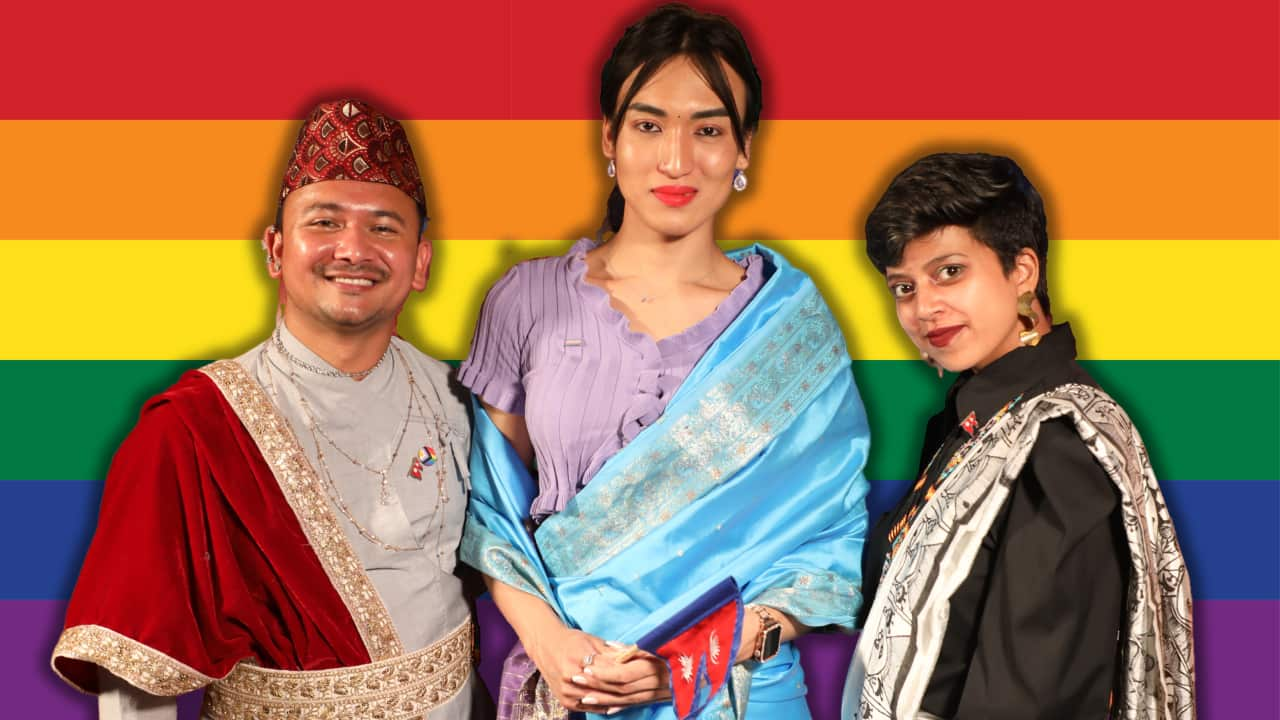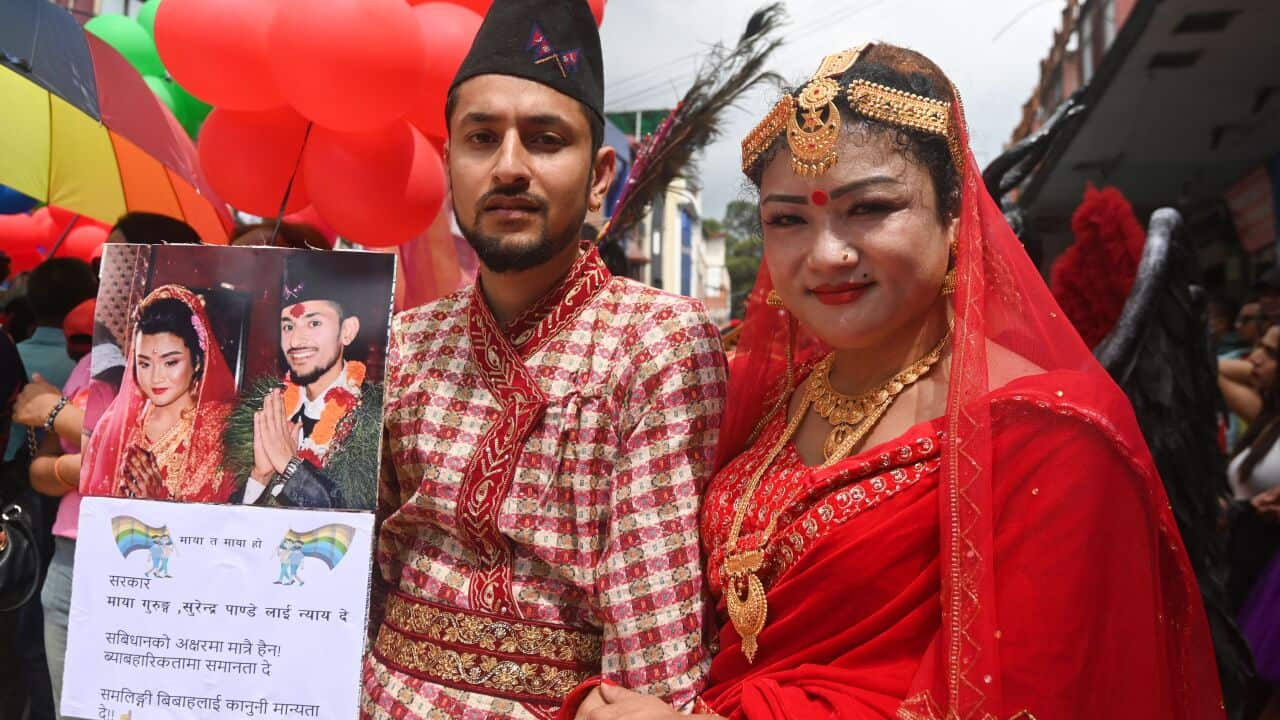Key Points
- The Nepali queer community is gearing up for its debut float in Mardi Gras 2024.
- Members say they hope the community back home will receive the respect it deserves.
- Float members say LGBTIQ+ education is needed in schools in Nepal.
This article contains references to suicide.
Pem Tamang, 26, said she began embracing the freedom to dress in feminine attire after moving to Australia five and a half years ago.
"Even in Nepal, I knew I was different and wanted to be female, but the societal and familial pressures made it difficult to come out," Tamang shared with SBS Nepali.
She said the end of 2023 marked a significant turning point for her as she started openly expressing her identity in front of her family.

Pem Tamang, 26, says she experienced true freedom only after coming to Australia. Source: SBS / Sunita Pokharel
Tamang broke the news over a messenger call.
"When a son is born, there is an expectation that he will bring a daughter-in-law, who will carry the family’s legacy. But I broke all the rules, now I just want to be who I am, and I am happy," she said.
Tamang is now one of 10 members of the Nepali Queer Community Sydney group set to take part in the Mardi Gras Parade on 2 March.
Abhishek Baniya will also be displaying his gender identity in the parade, something which he said he could never do back home.

Abhishek Baniya says he hope to see a change in attitude towards the LGBTIQ+ community in Nepal. Source: SBS / Sunita Pokharel
"I couldn’t say it directly, but I have a lot of queer friends, so I introduced them to my parents. At first, they were confused but, as they met many of them and I also started explaining things, they started understanding it," he explained.
He said his mother's acceptance had brought him joy.
"My mummy said, ‘If I could choose now, I would have a girlfriend’," Baniya said.
For Payal Mahato, "coming out of the closet" and expressing one’s identity was not necessary.
Mahato, who identifies as pansexual, said, “If the world is a safe space, nobody needs to come out. (Just) As no straight people come out as straight why do queer people need to come out as queer?”
Carrying Nepal’s pride in the parade
A group of friends, aspiring to represent Nepal in the Mardi Gras Parade, applied for a spot and successfully got selected.
Now, with nearly 30 members under the Nepali Queer Community Sydney banner, they are fully prepared for the day with props and designer clothes.

Nepali Queer Community Sydney members are gearing up for their Mardi Gras float showcasing their homeland. Source: Supplied / Nepali Queer Community Sydney
"We are really excited about props because we are working hard, we are making Boudhanath Stupa and Mount Everest. We are going to carry them while walking," Baniya said.
Payal, along with other group members, had volunteered in the parade last year.
"Volunteers walk last, and it was so overwhelming, full of love and support. And everyone being unconditionally themselves," Payal said.
After watching the Mardi Gras Parade from the street, Tamang said participating in a float was a dream come true.
"Last year I was there, and I really wanted to walk in the parade, and now wow! I will be there," Tamang said.
Payal said the Sydney pride parade stood in contrast with similar events in Nepal.
"I have been in parades in Nepal as well and people were staring. I would like to see that change, where people will be like wow this is amazing, and I am here rooting for you," Payal said.

From left to right: Payal, Pem, and Abhishek prepare for the Mardi Gras Parade. Source: SBS / Sunita Pokharel
"If life (gives me) the chance, I would like to see myself walking in the parade back in Nepal, and hopefully, I will see people around cheering for me and the community. Your respect and help are important. So please, show respect to whoever is walking in the parade," he said.
Are official changes translating into attitudes?
Tamang said she had been bullied over her sexuality in school and college when she used to identify as male, recalling a time when a teacher shamed her in front of class.
“I was very bad in maths and there was one teacher and he used to make me stand on the bench and would make fun of me saying I wear my mum’s clothes and I dance inside the room secretly,” she said.
However, Tamang said such bullying had only served to make her stronger today.
Baniya shared a similar experience from his childhood.
"Back then, even though you are just in Grade 6 or 7, you feel like you will commit suicide the next day. Going in front of the temple and questioning 'oh God, why (have) you made me like this, why did you make me so different than others?" he said.
Baniya said he hoped the people who bullied him would educate their children to be more accepting.
While Payal said they understood the need for Nepali society to be more accepting, it was not the responsibility of the queer community to raise awareness.
"It is not your responsibility to explain who you are, please don’t take that pressure, and don’t put pressure on other people as well," they said.

Payal asserts that acquiring knowledge about the LGBTIQ+ community would lead to increased respect and understanding. Source: SBS / Sunita Pokharel
Inclusiveness
One of the reasons Payal said they weren't worried about explaining their identity while in Nepal was the inclusive nature of the Nepali language.
"I didn’t have to tell anybody to use they/them pronoun to address me because in most conversations I find the Nepali language gender-neutral," they said.
Sunil Babu Pant, the founder of Nepali gay rights organisation Blue Diamond Society Nepal and Member of the Constituent Assembly from 2008 to 2013, expressed happiness about the use of inclusive language in Nepal's official documents.
For him, the "Other" option in the sex category provides room for a spectrum of identities.
"While registering marriage in Nepal, you will have the 'Other' option, which is much more inclusive, as we can select female and other, male and other; it is not limited to a male or a female," Pant said.
Nepal recently made global headlines by officially registering its first same-sex marriage.
While that milestone was the result of almost two decades of legal battles and advocacy, some community members say a lot still needs to be done to achieve equality in Nepal.
Without law, how did same-sex marriage become possible?
Nepal was hailed as a beacon of LGBTIQ+ rights after its Supreme Court delivered a groundbreaking verdict in 2007 declaring full fundamental human rights for individuals belonging to all sexual and gender minorities.
On 29 November 2023, Maya Gurung and Surendra Pandey became the first same-sex couple in Nepal to have their marriage officially registered, five months after the Supreme Court issued an interim order to register same-sex marriage and keep a temporary record.
Although the country has not passed any law, the Supreme Court's order made Nepal the second country in Asia to officially register a same-sex marriage.
Pant’s advocacy for LGBTIQ+ rights in Nepal played a significant role in prompting the Supreme Court to grant legal recognition to the country's third gender.
While he accepted that the absence of a law created confusion, Pant said the news was a win for all sexual minorities in Nepal.
"This (marriage) sends a message that love prevails in Nepal and it's a love revolution," he said.

Sunil Babu Pant (centre) with first legally registered rainbow couple, Surendra Pandey (L) and Maya Gurung (R). Credit: From Sunil Babu Pant's Facebook/Aman Shrestha
But he said the keeping of temporary records itself was a milestone.
"This marriage is confirmed because it attracts all the rights mentioned in the constitution and the court’s order is as good as law," Pant said.
Baniya said he still saw room to improve, and it should start from the schools.
"In Nepal’s schools, there is sex education, but it has not been taught properly and it absolutely stays silent about the LGBTIQ+ community. If children were taught that these kinds of people also exist, they would know about us and people would not get bullied like I did," he said.
Extending his best wishes to the Nepali group's participation in Mardi Gras, Pant acknowledged that changes for the LGBTIQ+ community were a work in progress.









